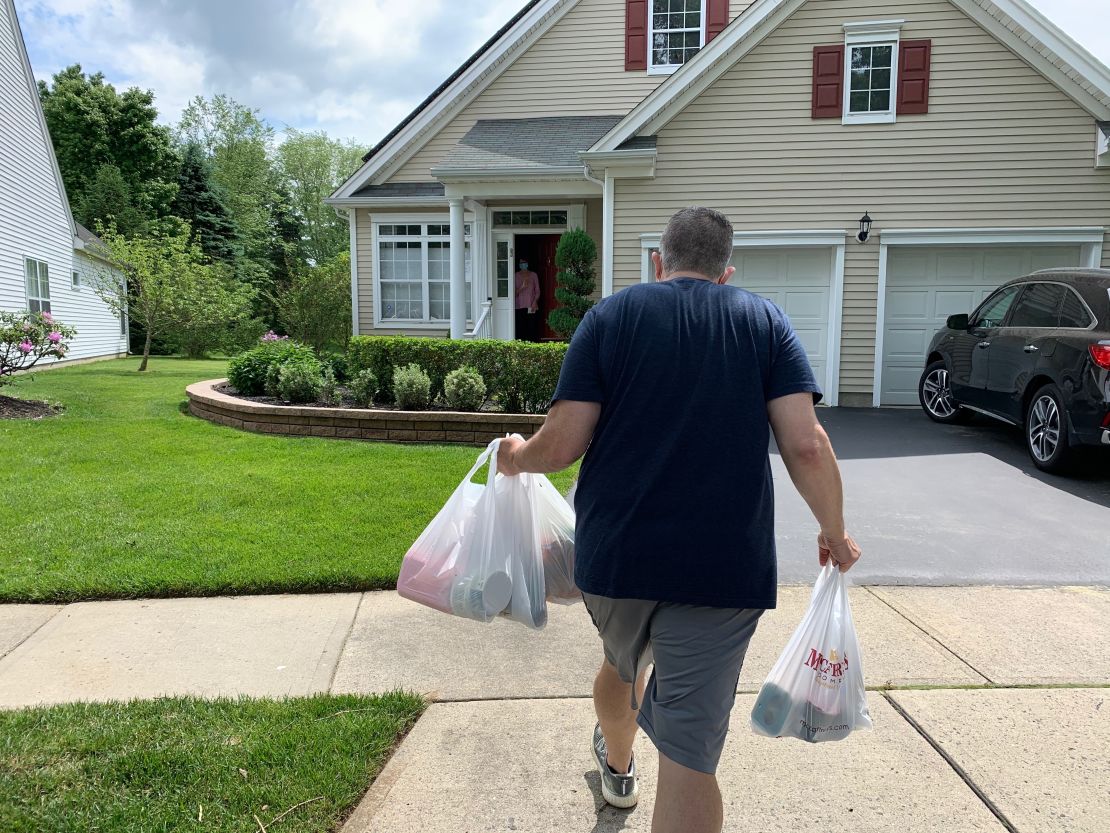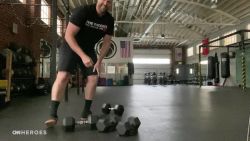Greg Dailey wakes up at 4 a.m. every day to start his newspaper route in East Windsor, New Jersey.
He’s had this second job for 25 years, but when statewide stay-at-home orders forced him to close his frame shop in late March, it became his main source of income.
For the last six months, Dailey, 51, has kept himself busy delivering far more than newspapers. He’s become a lifeline for 140 senior citizens who are afraid to venture out because of Covid-19.
To date, Dailey and his family have made more than 1,000 trips to the grocery store for seniors and delivered everything to their homes – for free.
This goodwill effort started when one of his elderly customers asked him to throw the paper closer to her door. A couple days later, while Dailey was in line at the grocery store, the 88-year-old woman popped into his mind.
“If she can’t walk 20 feet to get her newspaper, how is she getting groceries?’” he said. “So, I called her and asked if she needed anything.”
She gratefully accepted his offer and asked for a few items. Minutes later, she called back and asked whether he’d mind picking up some things for her neighbor across the street. After he dropped off their groceries, he had an epiphany.
“I deliver (newspapers) to 450 customers who live in senior developments,” Dailey said. “These are two people who live within a hundred feet of each other who can’t get out to get groceries. What about the rest of them?”
Two days later, all of Dailey’s customers found a note from him tucked in with their newspaper, offering his help.
“I understand during these trying times it is difficult for some to get out of their house to get everyday necessities,” the note read. “I would like to offer my services free of charge to anyone who needs groceries, household products, etc.”
Responses flooded in and word soon spread beyond the customers on his route. Since then, Dailey’s wife, two sons and his mother-in-law have all pitched in by answering the phone and helping with shopping trips.
His 24-year-old daughter, Erin, became his partner in the effort. They developed a system to keep track of the orders, which average between five to 10 a day. People are asked to fill out a spreadsheet with their contact information, any discount codes they have at various stores, as well as a detailed shopping list.
“For the most part, I try to keep it over e-mail,” Dailey said, admitting that isn’t always possible for his older customers. “Some people don’t have the ability to use technology like e-mail or texting. I have customers where I literally go to their house and pick up the notes off their door.”
After he gets home from his paper route around 7 a.m., Dailey and Erin organize the day’s orders. By 9 a.m., they’re usually at one of their two local supermarkets, where they split up the lists and get to work. Dailey often relies on a few helpful employees to locate any mystery items.
“The other day, I had a list that I was completely overwhelmed with. It had tons of fruits and vegetables and I had no idea what half of these vegetables were,” he said.
Once his car is loaded, they head out to make a round of deliveries. Dailey calls each house when he’s on the way, letting them know the total cost of their items. He drops the groceries in an agreed-upon place – be it the customer’s garage, the trunk of their car or on their doorstep – and picks up a check that reimburses him for the cost of the groceries.

After a quick lunch at home, they do a second round of shopping and deliveries, usually finishing between 6 p.m. and 7 p.m. Dailey goes to bed early so he can start over again the next morning.
During the first three months of this effort, they only took off Easter Sunday. But Dailey says the people he’s helping – he doesn’t like to call them ‘customers’ – make it well worth it.
“Some of them, honestly, want to talk. They’re lonely … while others just stand behind their door and give me the prayer hands,” he said. “It just melts your heart. The interaction just eliminates me being tired. It lifts you up and gives you energy because they’re so grateful.”
Joan Coppinger is one of his regulars. She suffers from emphysema, a respiratory disease that puts her at high risk for the virus, so she hasn’t left her home since March. Since her only daughter lives out of state, she says Dailey’s help has been a godsend.
“Without him, I don’t know how I’d get groceries,” she said. “The Instacarts and the people you call are all backed up for weeks.”
“He has a good heart and a great soul. He’s going straight to heaven.”
Dailey reopened his frame shop in early June, when restrictions were lifted, but he realized that as long as Covid-19 remained a threat, there would still be need for his work.
“I thought it would slow down, but I am still getting new people,” he said. “A lot are really scared to go out. I’ve told them, ‘As long as you need me, I’m going to be here.’”
Since Dailey’s business has reopened, his wife has taken on an even greater role and the family has been joined by 12 volunteers, mostly college students. Dailey is still very involved in making deliveries and is thinking about starting a nonprofit to enable people to support his work.
He knows the seniors he is helping will remain a part of his life going forward.
“Everything’s been from a distance, but I’ve become very fond of a number of them,” Dailey said. “There’s a bond that’s been created.”
“I honestly can’t wait to give these people a hug.”


















